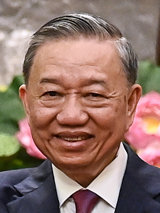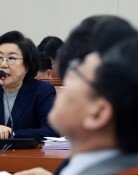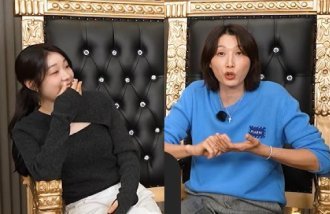Vietnam President To Lam gets top job as Communist Party chief
Vietnam President To Lam gets top job as Communist Party chief
Posted August. 05, 2024 08:17,
Updated August. 05, 2024 08:17

Vietnamese President To Lam (67, photo) was elected as Secretary General of the Communist Party, Vietnam’s highest-ranking position. Predictions suggest that President To Lam, who has led a large-scale anti-corruption investigation in recent years, will intensify investigations into high-ranking figures who could potentially compete with him in the future. This could potentially weaken the Vietnamese government's collective leadership system.
According to Reuters and local media outlet VN Express on Saturday, the Communist Party of Vietnam held a Central Committee meeting this morning and unanimously elected President To Lam as the successor to Secretary-General Nguyen Phu Trong, who passed away last month. General Secretary Trong, who took office as the 7th General Secretary of the Communist Party in 2011, was considered the longest-serving General Secretary since the end of the Vietnam War in 1975 and one of the most powerful leaders since Ho Chi Minh.
The successor, President To Lam, is classified as a ‘public security officer’ who has worked at the Vietnamese Ministry of Public Security for about 40 years since 1979. As Minister of Public Security in 2016, he gained fame by leading an anti-corruption investigation known as a “burning furnace” for several years. He will serve as Secretary General until 2026, completing the remainder of Secretary General Trong's term.
Based on his extensive experience at the Ministry of Public Security, there are predictions that President Lam could weaken Vietnam's collective leadership system. Vietnam's power structure is divided among the Communist Party Secretary General, the President, the Prime Minister, and the National Assembly Speaker, who are ranked 1st to 4th respectively. This system is designed to prevent the concentration of power in individuals and to promote political stability. However, in the past year, cracks in this leadership system have been detected, with two presidents being replaced midway and the National Assembly Speaker stepping down during his term.
Some suggest that with him serving as both Secretary General and President of the Communist Party, Vietnam could become similar to China, where President Xi Jinping has effectively established a one-man system. “If we do not nominate a president to replace President To Lam, it will signal the opening of a new chapter for Vietnam,” Nguyen Cac Giang, a researcher at the ISEAS-Yusof Ishaq Institute in Singapore, told Reuters. “This practice could continue beyond 2026 and become a standard.”
김윤진 kyj@donga.com



![[광화문에서/김준일]단식 마친 장동혁… 중요한 건 단식 그 다음](https://dimg.donga.com/c/138/175/90/1/wps/NEWS/IMAGE/2026/01/23/133221688.1.jpg)
![라면 먹고도 후회 안 하는 7가지 방법[노화설계]](https://dimg.donga.com/c/138/175/90/1/wps/NEWS/IMAGE/2026/01/23/133219600.3.jpg)


